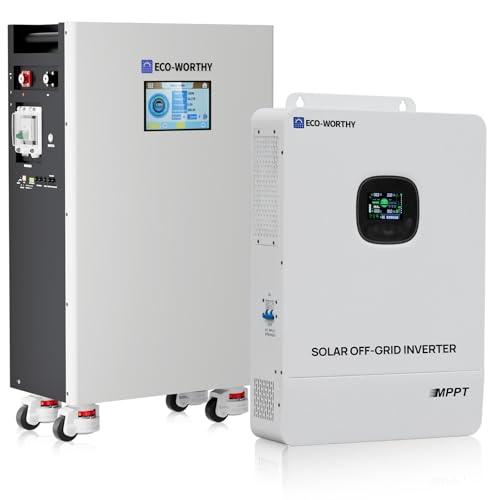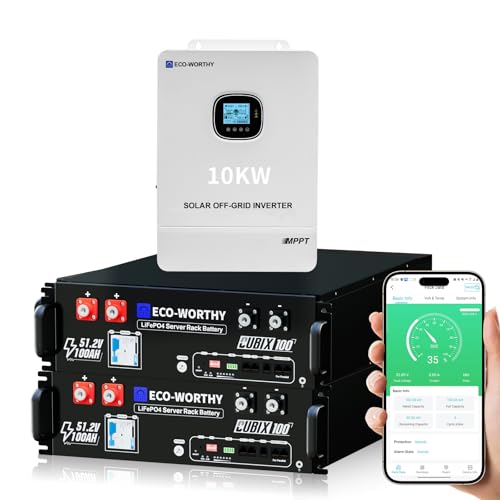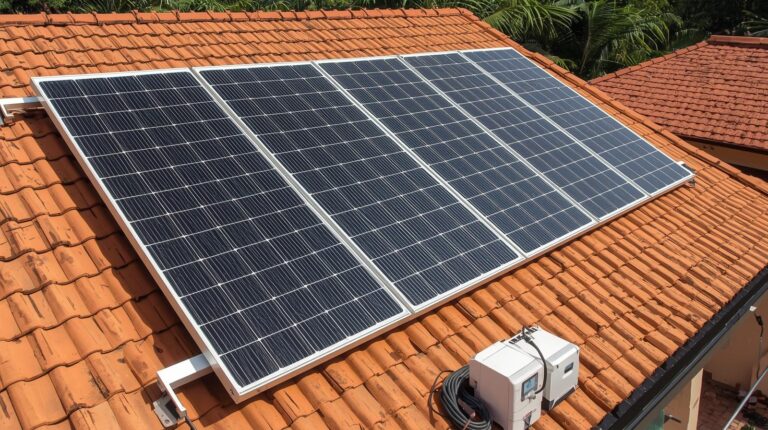A 10kWh battery can power a house for approximately 2 to 4 hours, based on factors like energy consumption habits, appliance efficiency, and load management techniques. If you want to optimize the duration, consider implementing energy-efficient upgrades, monitoring your usage patterns, and exploring solar integration to supplement the battery charge.
Understanding how to match your appliance needs with the battery capacity and ensuring high round-trip efficiency can help maximize performance. By following maintenance tips, charging strategies during off-peak hours, and planning for peak shaving, you can prolong the usage of your 10kWh battery effectively.
Key Takeaways
- Depending on energy consumption, a 10kWh battery can power a house for 4-8 hours.
- Efficient appliance usage can prolong battery life.
- Solar panel integration extends battery runtime.
- Managing load effectively optimizes battery performance.
- Regular maintenance and monitoring enhance battery efficiency.
Factors Affecting Battery Duration
When considering how long a 10kWh battery can power a house, it’s essential to understand the various factors that can affect its duration. The battery lifespan depends heavily on your usage habits and the energy sources available.
Efficiently managing your power needs, such as through load balancing and seasonal variations, can markedly impact how long your battery will last. Upgrading to more energy-efficient appliances and optimizing for peak demand can also extend its life.
Your user lifestyle plays a vital role in determining the duration a 10kWh battery can power your house, so being mindful of your energy consumption patterns is key. Additionally, incorporating reconditioned batteries into your off-grid energy system can provide a sustainable and cost-effective solution for longer-lasting power storage.
Understanding Energy Consumption Patterns
To comprehend the dynamics of energy consumption patterns within your household, it’s essential to analyze your daily usage meticulously. Understanding your peak usage times, appliance load, seasonal variations, and overall usage patterns is vital.
Conducting energy audits can help identify areas where efficiency upgrades can be made, such as switching to renewable sources or integrating smart technology for better control.
By tracking your energy consumption patterns, you can optimize your usage and potentially extend the runtime of a 10kWh battery. Recognizing when you use the most energy and which appliances contribute considerably to your consumption can guide you in making informed decisions.
Implementing changes based on these insights can lead to more efficient energy utilization and decreased reliance on the grid.
Calculating Battery Run Time
To determine the runtime of a 10kWh battery powering your house, you need to evaluate several factors influencing its performance.
Here’s how you can calculate the battery run time effectively:
- Energy Consumption: Understand your household’s average daily energy usage to estimate how long the battery can sustain your needs.
- Solar Integration: If you have solar panels, consider the amount of energy they generate daily. This input can extend the battery’s runtime by supplementing its charge.
- Load Management: Efficiently managing your electricity usage can greatly impact how long the battery will last.
Prioritize essential appliances and distribute their usage throughout the day to optimize battery performance.
Adding to this, SunPower batteries are known for their high round-trip efficiency rates, which can further enhance the overall performance of your solar battery system.
Importance of Battery Efficiency
Maximizing battery efficiency is essential when it comes to powering your home sustainably and cost-effectively. Efficient batteries not only save you money but also help reduce your carbon footprint.
When choosing a battery for your home, consider different battery types such as lead-acid, lithium-ion, or flow batteries. Lithium-ion batteries are popular for their high energy density and long lifespan, making them a top choice for solar integration.
By integrating solar panels with your battery system, you can harness renewable energy to charge your batteries, further enhancing your home’s sustainability. Efficiency is key in ensuring that the energy stored in your batteries is utilized effectively when needed. Opt for smart battery management systems that can optimize charging and discharging cycles, increasing the overall efficiency of your battery setup.
Investing in high-quality batteries and pairing them with efficient solar panels won’t only power your home reliably but also contribute to a greener future for all. For optimal performance, consider the round-trip efficiency of your battery system to minimize energy loss during charging and discharging.
Managing Backup Power Requirements
When it comes to managing backup power requirements for your home, there are three key points to take into account.
First, understanding the essentials of backup power systems is vital to guarantee uninterrupted electricity supply during outages.
Second, effective battery capacity planning is essential to match your energy needs with the right storage capacity. Solar panels can also play a crucial role in enhancing your energy independence and reducing reliance on the grid.
Backup Power Essentials
Ensuring your home has reliable backup power is essential for managing unexpected outages and emergencies. When considering backup power essentials, it’s vital to assess your needs and options. Here is a table to help you understand the key components:
| Backup Power Essentials | Details |
|---|---|
| Solar Integration | Harness solar energy for powering your home and charging batteries. |
| Battery Storage | Store excess energy for use during outages or when solar power is unavailable. |
| Generator Backup | Have a backup generator for extended outages or low sunlight periods. |
Battery Capacity Planning
To effectively manage your backup power requirements, it’s vital to carefully plan the capacity of your batteries.
When considering battery capacity planning for your house, integrating solar power into your system can enhance energy storage capabilities. Smart homes can benefit from load management strategies, which involve optimizing when and how energy is used to prolong battery life.
Peak shaving techniques help reduce electricity costs by storing excess energy during off-peak times for later use. Connecting your battery system to the grid allows for additional support during high-demand periods, promoting energy efficiency.
Utilizing renewable sources such as solar energy guarantees a sustainable power supply for your home. Understanding different battery types and their installation costs is essential in selecting the most suitable option for your needs.
Incorporating demand response mechanisms can further enhance your energy management, allowing you to adjust power consumption based on external factors. Efficient battery capacity planning is key to optimizing backup power for your home.
Energy Usage Considerations
To effectively manage your backup power requirements, you must carefully assess your energy usage considerations. When planning for powering your house with a 10kWh battery, it’s essential to focus on energy efficiency and load balancing to guarantee ideal utilization. By understanding your energy consumption patterns and implementing efficient practices, you can maximize the battery’s longevity during power outages.
Consider the following factors when evaluating your energy usage:
| Energy Usage Considerations | Description |
|---|---|
| Energy Efficiency | Focus on reducing wastage and optimizing energy usage to prolong the battery life. |
| Load Balancing | Distribute the energy load evenly across appliances to avoid overloading the battery. |
| Usage Patterns | Identify peak usage times and adjust energy consumption accordingly. |
| Alternative Power Sources | Explore renewable energy options to supplement backup power needs. |
Tips for Maximizing Battery Life
For maximizing the life of your battery, it’s essential to implement effective strategies that can prolong its longevity. To guarantee your 10kWh battery serves you well for an extended period, consider the following battery maintenance tips and ideal charging strategies:
Regular Maintenance:
- Keep the battery clean and free of debris.
- Check for any signs of corrosion on the terminals.
Proper Charging Practices:
- Avoid overcharging the battery.
- Charge the battery before it reaches low levels to prevent deep discharges.
Temperature Control:
- Keep the battery at moderate temperatures to enhance its lifespan.
Use Efficient Appliances:
- Opt for energy-efficient appliances to reduce the strain on the battery.
Invest in a Quality Inverter:
- Choose a high-quality inverter to guarantee smooth and efficient power conversion.
- Consider implementing smart energy management systems to optimize your battery usage and overall energy efficiency.
Potential Limitations of a 10kWh Battery
When considering the potential limitations of a 10kWh battery for powering a house, it’s essential to assess both the battery capacity and the energy consumption factors.
Understanding the maximum capacity of the battery and how much energy your household appliances and devices require will help you manage expectations and plan accordingly.
Factors such as the size of your home, the efficiency of your appliances, and your daily energy usage patterns can all impact how long a 10kWh battery can effectively power your house.
Battery Capacity Considerations
Considering battery capacity is vital when determining if a 10kWh battery can adequately power a house. When it comes to battery sizing and capacity optimization, there are some key factors to keep in mind:
- Energy Needs: Understanding your household’s energy requirements is significant in determining if a 10kWh battery can sustainably power your home. Factors such as the number of appliances, their energy efficiency, and usage patterns play a substantial role.
- Backup Power: If you plan to use the battery as a backup power source during outages, confirm that the 10kWh capacity aligns with your expected duration of backup power needs.
- Charging Efficiency: Consider the efficiency of charging the battery. Losses that occur during charging and discharging processes can impact the actual usable capacity of the battery.
- Expansion Options: Explore whether the 10kWh battery can be expanded or connected to additional storage capacity in the future if your energy needs increase.
Energy Consumption Factors
To determine the potential limitations of a 10kWh battery in powering a house, it’s essential to analyze the energy consumption factors that influence its effectiveness. When considering such factors, keep in mind the following:
- Solar Integration: Utilizing solar panels can help recharge the battery during the day, reducing reliance on grid power and extending its usage.
- Load Balancing: Efficiently distributing energy usage throughout the day can prevent sudden spikes that drain the battery quickly, ensuring a more stable power supply.
- Energy-Efficient Appliances: Opting for energy-saving appliances can considerably impact how long the battery can sustain your household’s power needs.
- Smart Energy Management: Implementing smart systems to regulate energy consumption based on priority can enhance the battery’s efficiency and longevity.
Future Trends in Home Battery Technology
For homeowners seeking more efficient and sustainable energy solutions, exploring the future trends in home battery technology is essential.
As technology advances, home battery systems are becoming more sophisticated, offering innovative features that cater to the growing demand for smart home integration and renewable energy advancements.
Here are some key trends to keep an eye on:
- Increased Energy Storage Capacity: Future home batteries are expected to have larger storage capacities, allowing homeowners to store more energy for later use.
- Enhanced Efficiency: Advancements in battery technology aim to improve efficiency, ensuring that more of the stored energy can be effectively utilized.
- Integration with Smart Home Systems: Home batteries will increasingly be integrated with smart home systems, enabling seamless energy management and optimization.
- Cost Reduction: With ongoing developments, the cost of home battery systems is projected to decrease, making them more accessible to a wider range of homeowners.
Conclusion
In summary, a 10kWh battery can power a house for approximately 2-4 hours, depending on various factors such as energy consumption patterns and battery efficiency. Remember to manage backup power requirements and maximize battery life to guarantee continuous power supply.
While there are potential limitations to take into account, advancements in home battery technology offer promising solutions for the future. So, be prepared and stay informed to make the most out of your home energy storage system.






